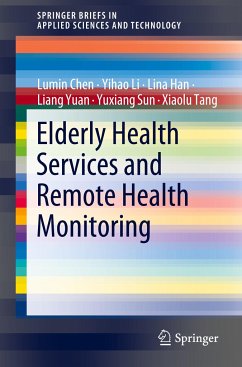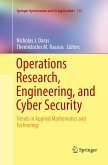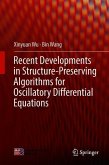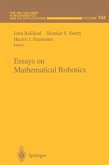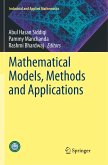- Broschiertes Buch
- Merkliste
- Auf die Merkliste
- Bewerten Bewerten
- Teilen
- Produkt teilen
- Produkterinnerung
- Produkterinnerung
This book focuses on typical health services and remote monitoring methods, such as visual recognition and deep learning. Chiefly addressing the design and simulation of rehabilitation devices, and the evaluation of their effects on various diseases, it offers a valuable resource for professional researchers and graduate students in the fields of elderly medicine, signal processing, and rehabilitation.
Andere Kunden interessierten sich auch für
![Recent Developments in Structure-Preserving Algorithms for Oscillatory Differential Equations Recent Developments in Structure-Preserving Algorithms for Oscillatory Differential Equations]() Xinyuan WuRecent Developments in Structure-Preserving Algorithms for Oscillatory Differential Equations85,99 €
Xinyuan WuRecent Developments in Structure-Preserving Algorithms for Oscillatory Differential Equations85,99 €![Operations Research, Engineering, and Cyber Security Operations Research, Engineering, and Cyber Security]() Operations Research, Engineering, and Cyber Security85,99 €
Operations Research, Engineering, and Cyber Security85,99 €![Recent Developments in Structure-Preserving Algorithms for Oscillatory Differential Equations Recent Developments in Structure-Preserving Algorithms for Oscillatory Differential Equations]() Xinyuan WuRecent Developments in Structure-Preserving Algorithms for Oscillatory Differential Equations85,99 €
Xinyuan WuRecent Developments in Structure-Preserving Algorithms for Oscillatory Differential Equations85,99 €![The Linearized Theory of Elasticity The Linearized Theory of Elasticity]() William S. SlaughterThe Linearized Theory of Elasticity105,99 €
William S. SlaughterThe Linearized Theory of Elasticity105,99 €![KKMT: Alternative Therapy for Knee Osteoarthritis Rehabilitation KKMT: Alternative Therapy for Knee Osteoarthritis Rehabilitation]() Chu Buh FranklinKKMT: Alternative Therapy for Knee Osteoarthritis Rehabilitation34,99 €
Chu Buh FranklinKKMT: Alternative Therapy for Knee Osteoarthritis Rehabilitation34,99 €![Essays on Mathematical Robotics Essays on Mathematical Robotics]() Essays on Mathematical Robotics77,99 €
Essays on Mathematical Robotics77,99 €![Mathematical Models, Methods and Applications Mathematical Models, Methods and Applications]() Mathematical Models, Methods and Applications54,99 €
Mathematical Models, Methods and Applications54,99 €-
-
-
This book focuses on typical health services and remote monitoring methods, such as visual recognition and deep learning. Chiefly addressing the design and simulation of rehabilitation devices, and the evaluation of their effects on various diseases, it offers a valuable resource for professional researchers and graduate students in the fields of elderly medicine, signal processing, and rehabilitation.
Produktdetails
- Produktdetails
- SpringerBriefs in Applied Sciences and Technology
- Verlag: National Key R&D Program of China (2017YFF0207400) / Springer / Springer Nature Singapore / Springer
- Artikelnr. des Verlages: 978-981-15-7153-4
- 1st ed. 2020
- Seitenzahl: 92
- Erscheinungstermin: 11. Juli 2020
- Englisch
- Abmessung: 235mm x 155mm x 6mm
- Gewicht: 163g
- ISBN-13: 9789811571534
- ISBN-10: 9811571538
- Artikelnr.: 59619613
- Herstellerkennzeichnung Die Herstellerinformationen sind derzeit nicht verfügbar.
- SpringerBriefs in Applied Sciences and Technology
- Verlag: National Key R&D Program of China (2017YFF0207400) / Springer / Springer Nature Singapore / Springer
- Artikelnr. des Verlages: 978-981-15-7153-4
- 1st ed. 2020
- Seitenzahl: 92
- Erscheinungstermin: 11. Juli 2020
- Englisch
- Abmessung: 235mm x 155mm x 6mm
- Gewicht: 163g
- ISBN-13: 9789811571534
- ISBN-10: 9811571538
- Artikelnr.: 59619613
- Herstellerkennzeichnung Die Herstellerinformationen sind derzeit nicht verfügbar.
Lumin Chen received the B.S. degree from Sichuan University, Chengdu, China, in 1984; received the M.S. degree from Nanjing University of Aeronautics and Astronautics, China, in 1987; and received the Ph.D. degree from Tsinghua University, Beijing, China, in 2004. He was a Research Fellow with the University of Toronto, Canada, from 2007 to 2008. He is currently an Associate Dean with Mechanical and Electrical Engineering Institute, Zhengzhou University of Light Industry. He has published more than 40 journal articles and conference papers and contributed as co-authors to one book in his areas of interest. His research interests focus on mechanical system dynamics, electromechanical virtual simulation technology, wearable medical equipment, and medical signal processing. Yihao Li received the B.S. and M.S. degrees from Chongqing University, Chongqing, China, in 2001 and 2004, respectively and received the Ph.D. degree from Huazhong University of Science and Technology, Wuhan, China, in 2013. He is currently a Deputy Director of Institute of Mechanical and Electrical Engineering, Zhengzhou University of Light Industry. He has published more than 10 journal articles and conference papers. His research interests focus on mechanical system dynamics, biomechanics, wearable medical equipment, and medical signal processing. Lina Han received the B.S., M.S., and Ph.D. degrees from Jilin University, Jilin, China, in 1995, 2000, and 2003, respectively. She was a Postdoctoral Researcher with Chinese PLA General Hospital from 2003 to 2005 and a Research Fellow with Kyoto University, Kyoto, Japan, from 2008 to 2009. She is currently a Research Fellow with the Department of Cardiovascular Internal Medicine, National Clinical Research Center for Geriatric Diseases, the Second Medical Center, Chinese PLA General Hospital, and PLA School of Medicine. She has published more than 100 journal articles and conference papers and contributed as co-authors to two books in her areas of interest. Her research interests focus on 3D modeling on cardiovascular systems, medical digital image, wearable medical equipment, and medical signal processing. Liang Yuan received his B.S. degree in engineering degrees from Zhengzhou University of Light Industry, Zhengzhou, China, in 2019. He has applied for two patents for invention. His main research interests focus on machine vision and data cross validation. Yuxiang Sun received the B.S. and M.S. degrees from Zhengzhou University of Light Industry, Zhengzhou, China, in 2017 and 2020, respectively. He has published one journal article and applied for three patents for his invention. His research interests focus on wearable medical equipment, medical system dynamics and electromechanical virtual simulation technology. Xiaolu Tang received the B.S. degree from Henan Agricultural University, Zhengzhou, China in 2016, and the M.S. degree from Zhengzhou University of Light Industry, Zhengzhou, China in 2019. She is currently an Assistant Engineer with the Luoyang Bearing Research Institute Co., Ltd. Her research interests focus on mechanical structure design of rehabilitation exoskeleton.
Simulation and Experimental Analysis of Auxiliary Lower Extremity Exoskeleton.- Simulation and Research of Upper Limb Rehabilitation Evaluation System based on Micro Inertial Sensor Network.- Generative Design and Simulation of the Exoskeleton.- Design and Simulation of Controllable Soft Driver for Exoskeleton Robot.- Design and Simulation Analysis of Rigid-flexible Hybrid Upper Limb Rehabilitation mechanism.- Classification and Treatment System for Facial Acne Vulgaris based on Image Recognition.- Comparative Analysis Soft Kinematics of Hand Rehabilitation Robot Powered by Pneumatic Muscles.
Simulation and Experimental Analysis of Auxiliary Lower Extremity Exoskeleton.- Simulation and Research of Upper Limb Rehabilitation Evaluation System based on Micro Inertial Sensor Network.- Generative Design and Simulation of the Exoskeleton.- Design and Simulation of Controllable Soft Driver for Exoskeleton Robot.- Design and Simulation Analysis of Rigid-flexible Hybrid Upper Limb Rehabilitation mechanism.- Classification and Treatment System for Facial Acne Vulgaris based on Image Recognition.- Comparative Analysis Soft Kinematics of Hand Rehabilitation Robot Powered by Pneumatic Muscles.

